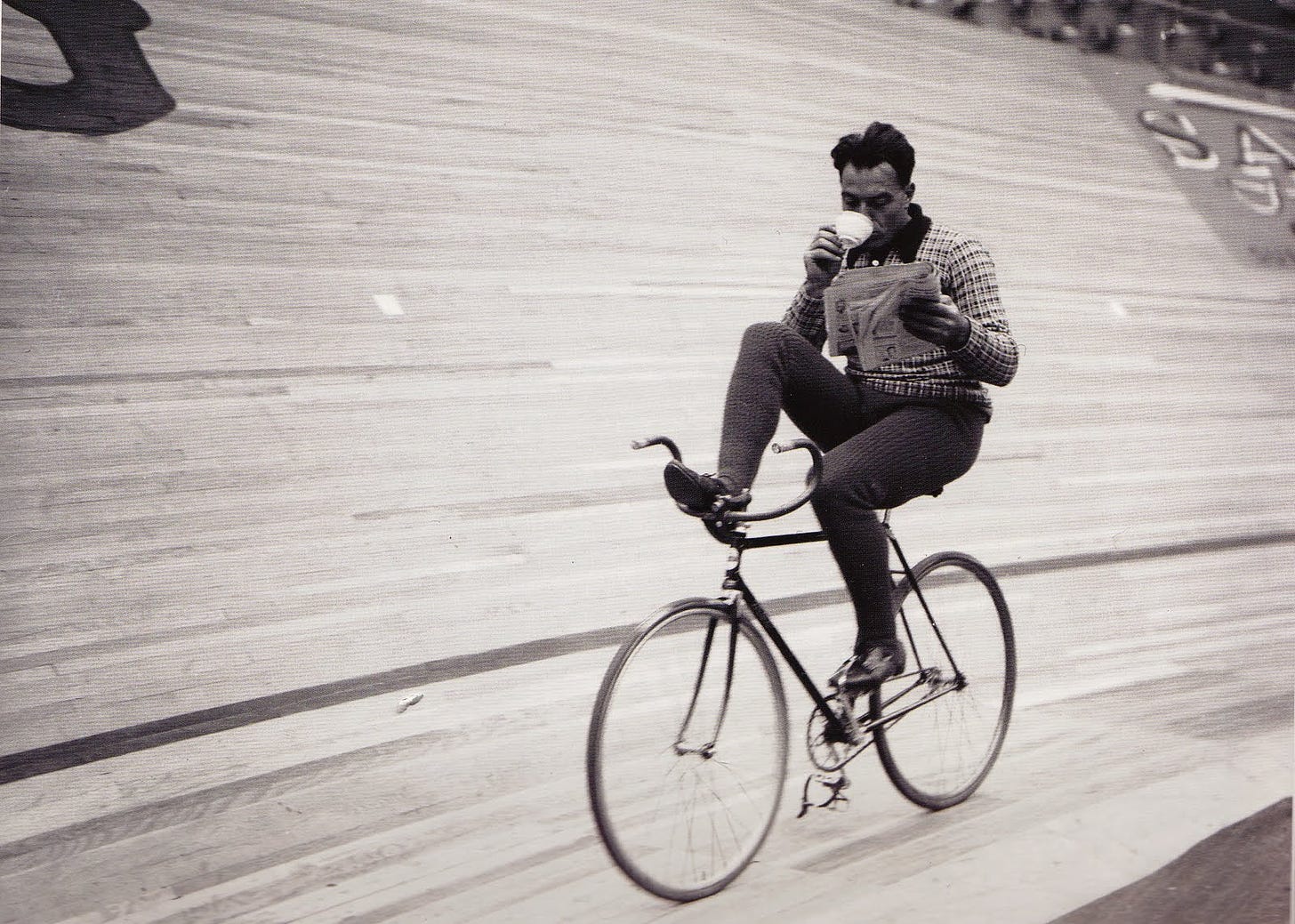Drink Café Before You Play?
Does coffee make a good pre-workout performance booster? Let's find out!
The Upshot, Upfront:
Coffee can be an effective pre-workout drink.
Coffee contains antioxidants that benefit your health in many ways.
Coffee makes you poop by stimulating your digestive tract to push things through.
Coffee isn’t for everyone, so don’t stress if you’re not into it.
FACT: As of this writing, three of the world’s five fastest marathoners are Ethiopian. Two of them raced Berlin in 2019, one raced London in 2019. They all cruised across the finish line just above two hours.
FACT (maybe): Legend has it that coffee was discovered in the ninth century when an Ethiopian goat herder named Kaldi noticed his goats prancing about after eating coffee beans. He decided to try them out for himself. (The beans, not the goats.)
There is no known record of Kaldi’s marathon time, but ask yourself: Is it just coincidence that coffee and the world’s fastest runners come from the same country?
Of course, it’s a coincidence! I got 99 theories why Ethiopian and Kenyan runners are so fast, and coffee ain’t one--but that doesn’t impede my undying love for a strong cup o’ java.
Caffeine redux.
A couple weeks ago, the NPB newsletter discussed how caffeine is ergogenic, thus boosting exercise performance, the gist being that caffeine is ergogenic, thus boosting exercise performance.
There are countless supplements out there that provide pre-workout caffeine. Many of them include additional actives to increase performance. I don’t question the science or efficacy of (some of) these other ingredients but, keeping it real, caffeine does most of the heavy lifting when it comes to many pre-workout sups.
With that in mind, I propose that you consider coffee an acceptable vehicle for pre-workout caffeine.
There’s a pile of research indicating coffee benefits exercisers. Here’s a study showing coffee worked for “cyclists/triathletes” when consumed before they hit the road. Here’s a study showing coffee worked for “resistance-trained men” before they hit the weights. (By the way, I really like that term “resistance-trained men.” I wish I’d known it back when I was dating. When a woman inquired about my physique, I could have said I was a “resistance-trained man.” I feel this would appeal to a certain type of woman.)
A few wee problems with coffee.
There are a couple obstacles regarding pre-workout coffee. First, if you’re a numbers person, you can’t be sure you’re getting “X” milligrams of caffeine per serving. Your average eight-ounce cup of brewed coffee contains about 95mg—but it varies depending on the beans and the brewing technique. Second, if you need more caffeine, that means more coffee. For example, if you’re shooting for 200mg, that means 16 ounces of coffee—and a guaranteed mid-workout pee break.
Speaking of urine, you may have heard that coffee is a diuretic, meaning it draws water out of your system. A number of studies disprove this, but they tend to be sponsored by tea, coffee, or other caffeine-hawking companies. (The linked study was funded by a company that makes caffeinated gum.)
I don’t know which side I’m on, frankly, so I hedge my bets. I don’t count my beloved morning cups towards my totally daily water intake.
Coffee’s health benefits.
On the upside, coffee is real food. I wouldn’t go so far as to say it’s whole food, but you pick the beans, roast them, grind them, and force hot water through them. That’s coffee.
Some claim that coffee is carcinogenic, meaning it causes cancer. This science is more dated than skinny jeans (#tiktoksaidso #appealingtoayoungerdemo). A few years ago, there was an uproar over acrylamide, a chemical created during roasting, but the science doesn’t hold up given the stuff only becomes dangerous in huge doses—like thousands of times more than you get in coffee. Heck, even the American Cancer Society debunked this conspiracy by offering a list of other foods containing acrylamide including toast, potato chips, pretzels, crackers, cookies and cereal.
In fact, moderate coffee intake has been shown to lower the risk of several forms of cancer. Harvard’s School of Public Health also links it to helping prevent type 2 diabetes, heart issues, depression, Parkinson’s, Alzheimer’s, gallstones, and just death in general.
Coffee is also chock full o’ antioxidants—substances that fight free radicals.
The oxidation-reduction—or redox—cycle is important to all kinds of biological processes. Basically, stress builds up the concentration of free radicals in your system. Free radicals break things down. Antioxidants fight these free radicals and build things back up again. This perpetual battle is called the redox cycle and it’s good because every time it happens, your body adapts and rebuilds stronger.
This redox cycle plays an important role in a few exercise-related processes, including muscle function and glucose uptake.
The redox cycle is only problematic when you break down more than you build. This is why you should include plenty of antioxidants in your diet from sources like veggies, fruits, and—if you tolerate it—coffee or tea.
Chlorogenic acid is the main antioxidant in coffee. It may sound like something you clean a swimming pool with but it’s good stuff, thanks to its potential “anti-diabetic, anti-carcinogenic, anti-inflammatory, and anti-obesity impacts.”
From an exercise performance perspective, chlorogenic acid is not ergogenic. However, there’s some research showing that chlorogenic acid, when combined with caffeine, may possibly help with glycogen uptake into muscles. In other words, that post-ride coffee and donut may have performance benefits.
Coffee for precision pooping.
More importantly, coffee helps assure you offload unwanted freight before you head out the door. One survey indicated that it helped about 29% of participates to poop. (TMI: I’m in that lucky third.) You cyclists and runners out there know why pooping matters. There’s nothing worse than heading out with a full load, especially for runners who have a habit of squeezin’ the cheese at the wrong time.
They used to think caffeine caused this reaction until they figured out that decaf makes you poop too. Science isn’t 100% certain why coffee does this—after all, there are around 1,000 compounds in coffee—but they know it promotes gastric acid in your stomach, which causes food to move to your intestines faster. It also promotes peristalsis, which are the inch-worm-like movements in your digestive system that push food down and out.
The American Chemical Society explains it here. I really wish I made this video.
On a final note, I can rhapsodize all day about how awesome coffee is, but if it doesn’t agree with you, you should not force yourself to drink it. Maybe it upsets your stomach or prevents sleep. You can experiment with low-acid coffees or limit your intake to morning, but you don’t need it. There are plenty of successful resistance-trained men (and women) who never touch the stuff.
But, still, I really love it.






Nice one! I love drinking coffee on a long bike ride. I'll stop into a cafe, getting some espresso or an americano, and I'm on my way again. Feels great.